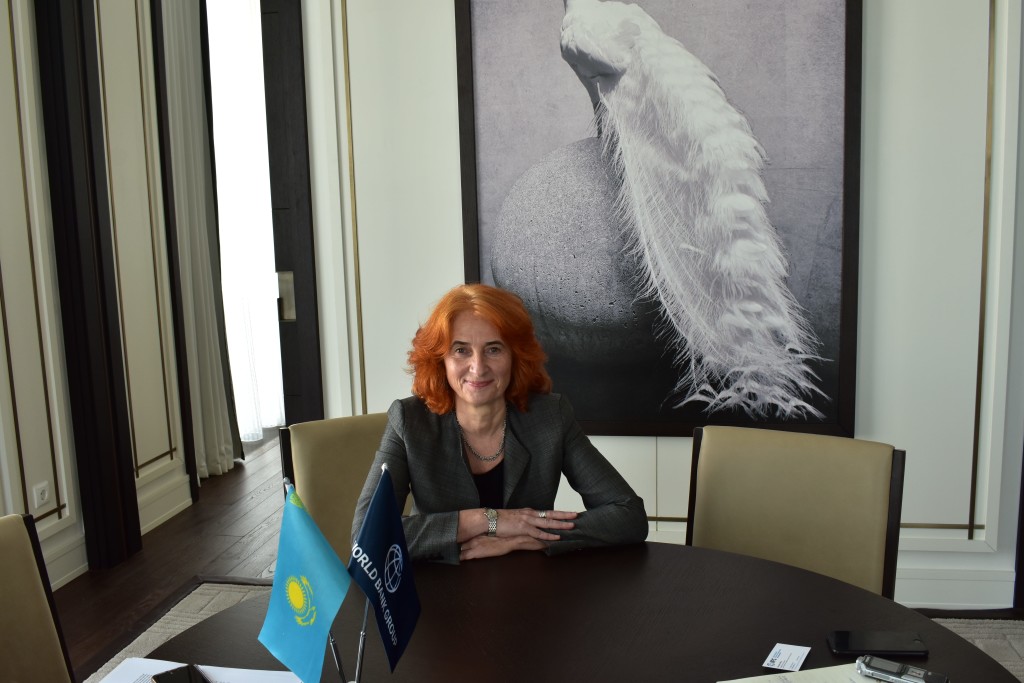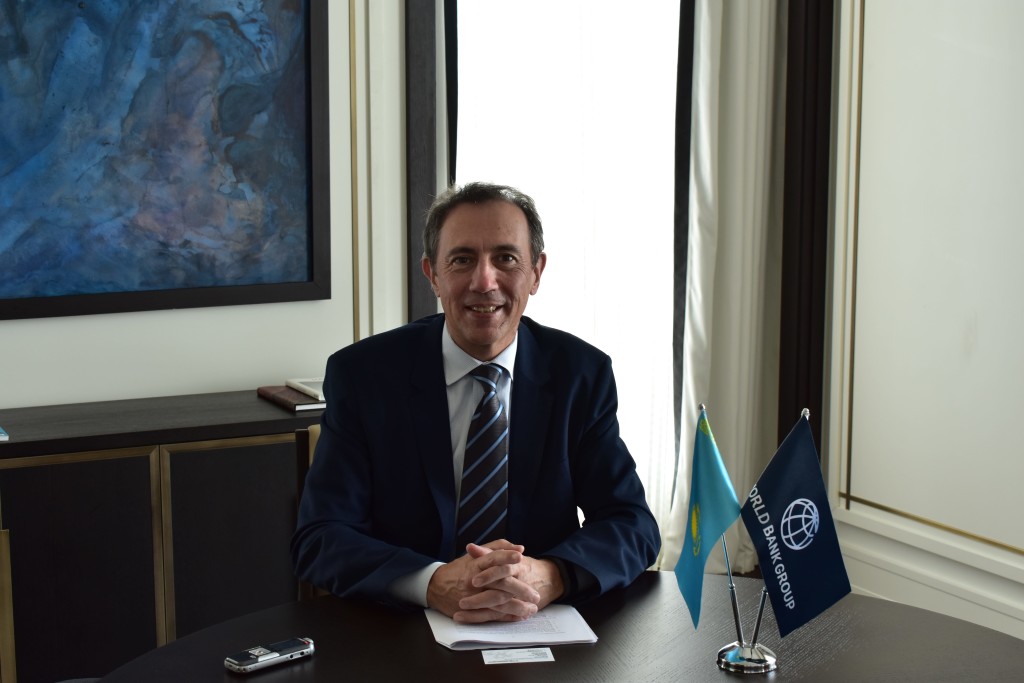ASTANA – The World Bank (WB) is supporting Kazakhstan’s course towards diversified growth. Over 25 years of cooperation, the WB has provided loans for 46 projects totalling more than $8.1 billion.
In an exclusive interview with The Astana Times, WB Vice President for Europe and Central Asia Cyril Muller said the bank’s partnership with Kazakhstan has been very successful.
Today, the bank portfolio includes 13 projects worth of $3.8 billion.
“The World Bank was focused to develop infrastructure, for instance, in energy, in transport, but also to focus on what we call human development. Kazakhstan is now an upper middle-income country. It is time for us to shift to the constraints or the barriers to Kazakhstan becoming a high-income country. Kazakhstan currently has the ambition to become a high-income country,” he said.
The bank conducted analyses, including the systematic country diagnostic to identify the future areas of cooperation.
“The first one is human capital. It is not about the access to education or health. It is about the quality of education, the quality of the health services. We hope to continue on helping Kazakhstan to acquire the skills needed for a modern economy and for young people to have opportunities to grow and become prosperous over time. The second area is the diversification of the economy. We are pleased to see that the government is putting a lot of focus on that. We expect agriculture and food to be a source of growth in the future. The third area is building institutions that are fit for the future,” he said.
Muller also spoke about the 2018 GDP growth forecast, which was revised upward from 2.6 percent to 3.7 percent.
“We are pleased that the economy is improving and performing better. The opportunities going forward to continue to grow and accelerate growth further have to come through diversifying the drivers of growth and broadening the growth of the economy. There is a bit of a threat or a weakness in the financial sector. There has been a lot of consolidation in the financial sector and I believe the processes are not yet completed,” he said.
The key question is how banks have been adjusting to having non-performing loans on their balance sheets. They have had to shrink their activities.
“Now the question mark coming ahead is how banks can complete their stabilisation and complete the restructuring of the banking sector, and restart focusing on their main function – intermediation and risk taking. I expect that a lot of focus in the country will continue to be on the financial sector for the next 12 months or so. The factor I would seek to influence economic performance going forward is related to the improved economic relations within Central Asia and, in particular, the booming trade between Kazakhstan and Uzbekistan. I believe this will also provide impetus for future growth,” he said.
Muller welcomed the Astana International Financial Centre’s (AIFC) ambition to become a regional hub in finance.
As long as economic policies are carefully crafted, and there’s no overspend, the inflationary pressures are within reason, Muller said.
“We are advising the government to be careful to manage well both the fiscal side and the financial side of the economy in a way that the National Bank is pursuing a policy of inflation targeting which I think is relevant. These policies put together will mean that there will be moderate or low inflation in the future. This will support over time the purchasing power of citizens as well. We are talking about the economy growing at about 4 percent; the ambition is to have the economic growth above 5 percent. I think this can be achieved and this also can be achieved in a manner in which the purchasing powers of citizen also grow over time,” he added.
Recently, the bank has drawn attention to the Maximising Finance for Development approach to leverage all sources of finance, expertise, and solutions to support developing countries’ sustainable growth.
“We need to find a way to support the government attracting private sector financing, because there are very large amounts of financial resources which financial institutions hold in the private sector and they are looking for investment opportunities. We want to be supportive of those resources. We’d like to participate in helping Kazakhstan have benefit from initiatives such as the Belt and Road Initiative, but also the improved regional cooperation opportunities that are arising right now,” he said.
International Financial Corporation (IFC) Vice-President for Latin America, the Caribbean, Europe and Central Asia Georgina Baker said that now the agriculture sector is a key focus.

International Financial Corporation’s Vice-President for Latin America, the Caribbean, Europe and Central Asia Georgina Baker.
The IFC is the private sector arm of the World Bank Group that addresses development challenges through financing and supporting private sector projects.
“The IFC is always interested in any projects that will help develop the economy, bring development impact, create jobs and help the economy grow. IFC wants not only to help the economy grow here, but to bring investment in, to help international investors. Usually private sector investors follow our investments and this can be the case in Kazakhstan,” said Baker.
The country ranks 36 out of 190 countries in the World Bank’s 2018 Doing Business Report and has the best investment climate in Central Asia.
“Kazakhstan has two close neighbours in China and Russia. Connectivity and being able to sell products to both markets is huge and important for a large country like Kazakhstan and it is a significant advantage to have these neighbours with such large markets. Connectivity and logistics are vital for the growth of the country. The new Silk Road is clearly something that’s going to be a benefit to Kazakhstan,” she said.
Baker also spoke about the Big Almaty Ring Road project, the IFC-supported public-private partnership (PPP).
“We are very proud of this project. It took a number of years of hard work to come to completion. The public private partnership between the government and private investors is an important way to bring private sector financing into the infrastructure that a country wants to build,” she said.
The IFC intends to participate in other PPP programmes with the Almaty University Hospital.
“We have submitted a proposal, which is now with the Ministry of Healthcare and will then hopefully progress through parliament. We have done PPPs with hospitals in Turkey and we would like to bring that experience to this project. PPP is an important way of crowding in capital, whether it is from other multilateral and development finance institutions or private sector financial sources into infrastructure projects in this country,” she said.
IFC invested around $1.55 billion since 1997, including $300 million in syndicated loans to support the implementation of 61 private sector projects in the financial, gas, mining, agricultural and industrial sectors.


